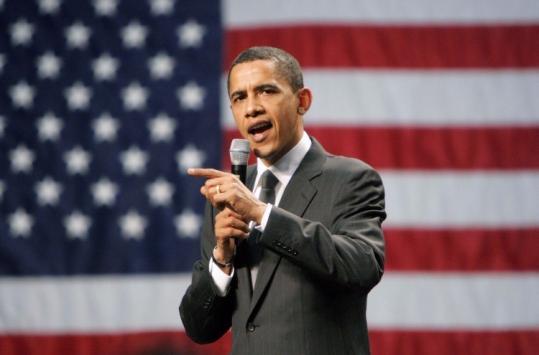After the US elected its first black president, JOHN HARRIS looks at the role the Internet played in Barack Obama's successful campaign for the White House.
I was at a Steve Earle concert on the eve of this week’s US election where the singer and his wife, Alison Moorer, proclaimed their support for Barack Obama.
While Earle’s liberal inclinations are no surprise to anyone who hears his songs, the audience reaction was: The packed Norwood Town Hall erupted in cheers.
This passionate applause for a national vote on the other side of the world is just the latest indication of the truly groundbreaking nature of this week’s election in the US.
The election of Barack Obama as the first black president of the US was marked by more than the race and age of its candidates. It signified the first truly Internet campaign.
 While the team of self-confessed technophobe John McCain used YouTube and tweaked Twitter alongside his preferred town stumping approach, Democrat Barack Obama’s campaign set the pace.
While the team of self-confessed technophobe John McCain used YouTube and tweaked Twitter alongside his preferred town stumping approach, Democrat Barack Obama’s campaign set the pace.
Since starting his run for the presidency, Obama has used information technology to run one of the most organised, methodical and well-funded campaigns in American history.
Backed by the discipline of Chicago machine politics, Obama used social networking tools to not only communicate his message to the voters of the US, but to recruit them to fund his campaign and engage them to lobby their communities in support of his presidential bid.
Obama’s fundraising capacity completely blew away the publicly-funded $84 million available to McCain: The BBC reports that he had raised $605 million by the end of September. Obama's campaign manager was quoted as saying the average donated amount was $86.
This touch-the-people strategy aligns with Obama’s rhetoric. In his August acceptance speech for the Democratic presidential nomination, he said: “All across America something is stirring. What the naysayers don't understand is that this election has never been about me; it's about you”,
Unlike previous elections, it is now easy for Americans (and Australians) to get direct access to campaign materials by visiting websites such as www.barackobama.com or www.johnmccain.com – when they want it.
YouTube – created in February 2005, three months after the 2004 presidential vote – has played a pivotal role by allowing anyone to view everything from campaign ads to the presidential candidate debates online.
Indeed, after I missed the first half of the second debate by wrongly programming the video recorder last month, I used our Playstation3 to open a web browser and watch the debate on YouTube.
Even my beloved iPhone has got into the election game: In the AppStore, I found a free program called Obama 08 has extensive information about news, events, issues and organising activities for the Obama-Biden campaign. The iPhone app even prompts me to call friends or get involved in the campaign, a persistence of invitation that is reiterated through a wide range of online media, from texting and Twitter to wikis and Facebook.
The point is that Obama integrated technology with the process of field organising for his campaign. Volunteers drew on campaign databases and the www.myBarackObama.com for up-to-date information about potential voters' political leanings, thus focussing resources on lobbying likely Obama voters and the all-important “undecideds” while avoiding calls to McCain supporters.
The Internet’s impact on political mobilisation was demonstrated by this week’s record turnout at the poll, which invites speculation of whether Barack Obama will continue to leverage its power for popular consultation during his presidency.
More significant is the question of whether the problems produced by this unprecedented demonstration of democracy will finally force the US to overhaul its antiquated voting system, so its citizens can choose their president with technology as modern as that used to shape their decisions.
John Harris is managing director of Impress Media Australia. You can view his website at www.johnharris.net.au .
Related News
- Get set to catch the new wireless wave A new generation of wireless computer networks, which work faster and farther than before, is about to arrive, reports JOHN HARRIS. What I love about talkback radio is that ...
- Intel chips away at the confusion As he looked for a new notebook recently, JOHN HARRIS discovered that even chip giant Intel believes that the confusion caused by computer jargon is a problem. It’s re...
- A brief history of broadband As the Rudd Government prepares to roll out its $42 billion National Broadband Network, JOHN HARRIS explains how fibre optic communication provides Australia's path to the future. ...
- Saved by a ghost in the machine When a disrupted software upgrade cruelled his office network, JOHN HARRIS discovered that his notebook developed a mind of its own.I was working on my computer last week when a no...












